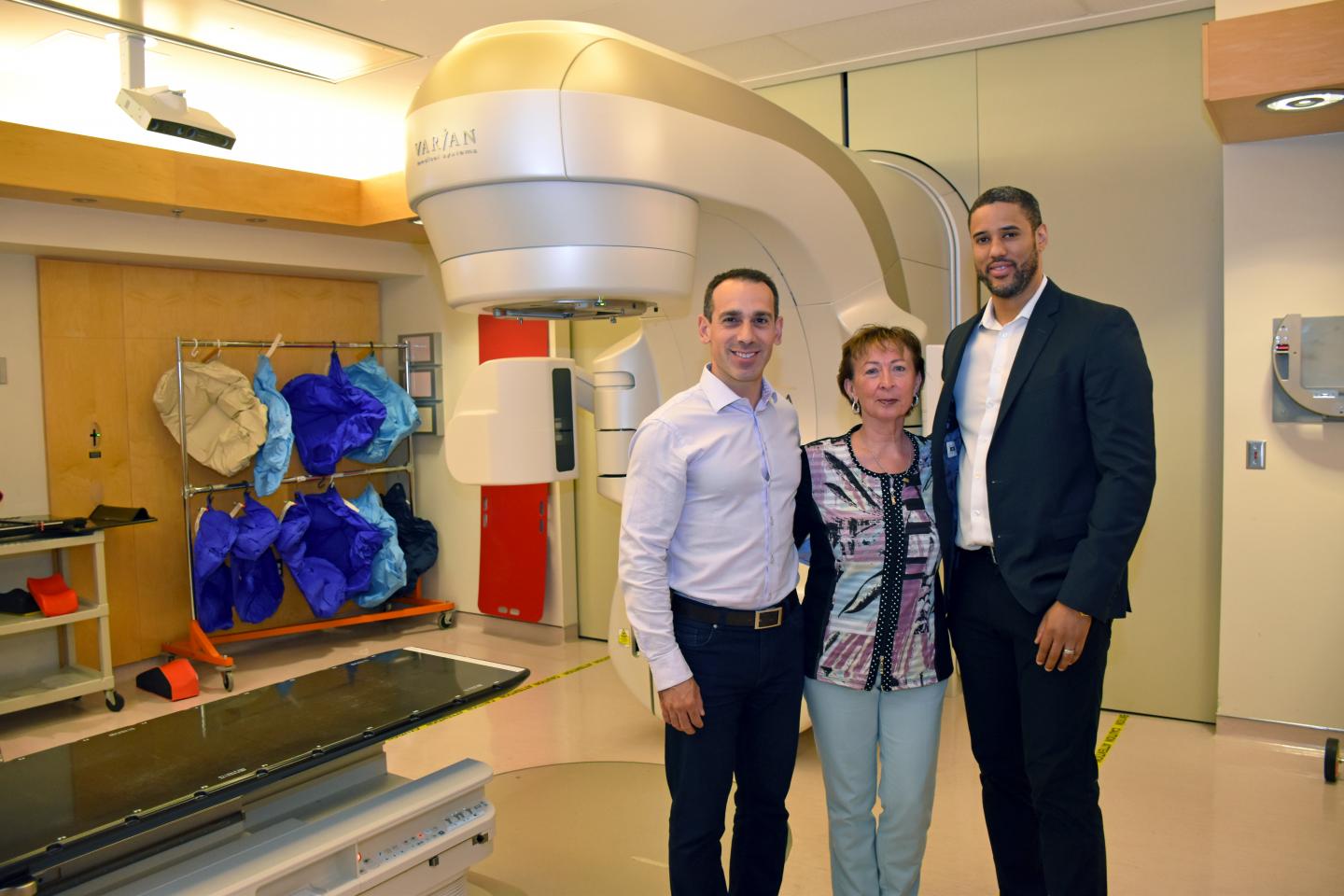Results from world first trial could influence treatment decisions for patients with oropharyngeal cancer

Credit: Lawson Health Research Institute
LONDON, ON – In 2012, scientists at Lawson Health Research Institute launched the world’s first clinical trial comparing robotic surgery to radiation therapy for the treatment of oropharyngeal cancer (cancer at the back of the throat). The team is now reporting findings from the seven-year study which challenges beliefs that surgery leads to better swallowing outcomes, suggesting instead that radiation results in better quality of life for patients.
For Betty Ostrander, an operating room nurse from Tillsonburg, Ontario, a throat cancer diagnosis was life-changing. Betty was 59 when she discovered a small lump on the right side of her neck. After seeking medical care and testing, she was told she had oropharyngeal cancer.
“I remember thinking ‘I’m healthy, I eat right and I exercise; this can’t be happening to me.’ But it was, and it was scary,” recalls Betty. “One of the first questions I asked was whether there were any clinical trials available.”
Betty was one of 68 research participants in the ORATOR trial. The study included six centres from across Canada and Australia, including London Health Sciences Centre’s (LHSC) London Regional Cancer Program. Participants were randomized to receive either precision radiation therapy, often combined with chemotherapy, or transoral robotic surgery (TORS).
TORS is a surgical method for treating throat cancer which uses a small 3D camera and miniature robotic instruments to remove tumours. LHSC was the first centre in Canada to offer TORS in 2011.
“Early studies suggested TORS might reduce the risk of swallowing problems historically associated with radiation and it therefore rose quickly in popularity,” explains Dr. Anthony Nichols, Associate Scientist at Lawson and Head and Neck Cancer Surgeon at LHSC. “But there was no randomized trial to compare patients’ swallowing outcomes. As the first centre in Canada to offer TORS, we decided to tackle this problem through the ORATOR trial.”
The research team found no difference in survival between the two groups but, surprisingly, participants in the radiation group experienced better swallowing outcomes. A mild decline in swallowing function was observed in 40 per cent of the surgery participants compared to 26 per cent of radiation participants. All participants were able eat a full diet after treatment but 16 per cent from the surgery group said they needed to specially prepare their food.
“Our findings challenge the notion that TORS leads to better swallowing outcomes,” says Dr. David Palma, Associate Scientist at Lawson and Radiation Oncologist at LHSC. “While radiation was previously associated with poor swallowing outcomes, treatments have advanced considerably and are now much more precise, which may be leading to better patient outcomes.”
Patients in the surgery group were also at risk for dangerous bleeding during surgery. One year after treatment, patients in the surgery group were more likely to experience pain (22 per cent versus eight per cent in the radiation group), use painkillers (45 per cent versus 15 per cent), have issues with their teeth (12 per cent versus one per cent), and experience shoulder impairment.
The team found that patients in the radiation group experienced more short-term constipation and a temporary drop in blood counts. They also experienced an increased risk of tinnitus (ringing in the ears) and high frequency hearing loss when receiving chemotherapy, with some needing hearing aids.
“Each therapy has its different potential side effects but our findings suggest that TORS is not superior to modern radiation,” says Dr. Nichols. “We hope this research can be used by patients and their oncologists to help inform treatment decisions.”
Cases of oropharyngeal cancer have more than doubled since the 1990s. While throat cancer was more common in elderly patients with a history of heavy smoking or drinking, physicians have seen a dramatic rise in cases caused by human papilloma virus (HPV).
There is fortunately a high survival rate in patients with HPV-related throat cancer, leading researchers to study quality of life after treatment.
Drs. Nichols and Palma recently launched the ORATOR 2 trial which will further compare TORS against radiation and chemotherapy. The goal is to reduce the intensity of radiation and chemotherapy to improve quality of life while maintaining survival rates. The team aims to recruit 140 participants.
Results from the ORATOR trial were shared by Dr. Nichols at the American Society of Clinical Oncology’s Annual Meeting on May 31, 2019. The study was funded by the Canadian Cancer Society.
###
Lawson Health Research Institute: As the research institute of London Health Sciences Centre and St. Joseph’s Health Care London, and working in partnership with Western University, Lawson Health Research Institute is committed to furthering scientific knowledge to advance health care around the world. http://www.
For more information, please contact:
Robert DeLaet
Communications & External Relations
Lawson Health Research Institute
T: 519-685-8500 ext. 75664
[email protected]
http://www.
Link to abstract: http://abstracts.
Media Contact
Robert DeLaet
[email protected]
Original Source
https:/




